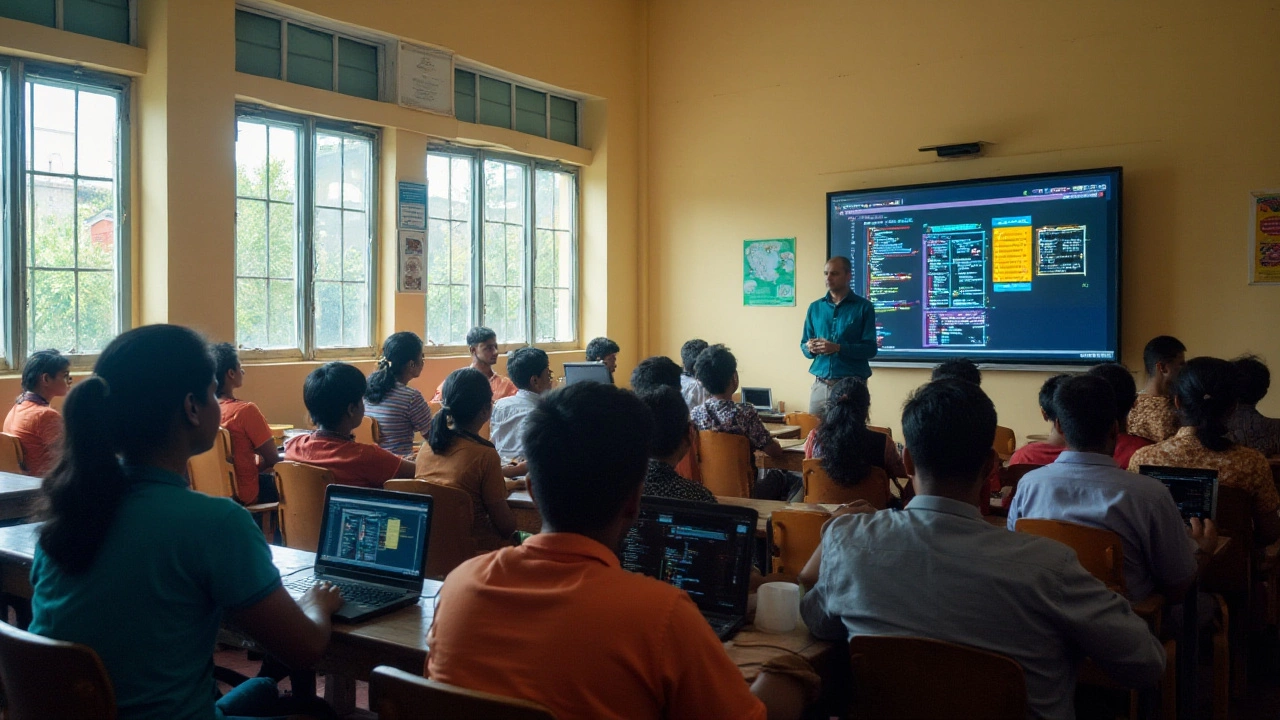JavaScript – Your Go‑to Guide for Beginners and Beyond
If you’ve ever wondered how the interactive parts of a website work, the answer is almost always JavaScript. It powers everything from simple button clicks to complex single‑page apps. This page pulls together the most useful articles from our site, so you can get a clear picture of what JavaScript is, why it matters, and how it stacks up against other popular languages.
Why Choose JavaScript?
First off, JavaScript runs right in the browser. That means you don’t need any special setup—just a text editor and a web page, and you can see your code in action instantly. This instant feedback loop makes learning feel like playing a game rather than staring at a textbook.
Another big plus is the community. From Stack Overflow to countless YouTube tutorials, help is always a click away. Because so many developers use JavaScript, new libraries and frameworks show up all the time, giving you fresh tools to build faster.
Finally, JavaScript isn’t limited to the front end. With environments like Node.js, you can write server‑side code, create APIs, and even script desktop apps. Learning JavaScript opens doors to full‑stack development without learning a whole new language for the back end.
JavaScript vs. Other Languages
One common question is how JavaScript compares to Python. Python shines in data analysis and scientific computing because of its simple syntax and powerful libraries. JavaScript, on the other hand, dominates the web. If your goal is to create interactive websites, JavaScript wins the race for relevance.
What about Java? Despite the similar names, they serve different purposes. Java is a compiled language used for large‑scale enterprise applications, Android apps, and high‑performance systems. JavaScript is interpreted, lightweight, and designed for the browser. For most beginners aiming at web development, JavaScript is the quicker path to visible results.
Our article “Is Python More Beginner‑Friendly Than JavaScript?” breaks down the learning curve, pointing out that Python’s clean syntax can feel easier at first. But the same article also notes that JavaScript’s ubiquity on the web means you’ll find more real‑world projects to practice on right away.
The piece “Is JavaScript Simpler to Learn Than Java?” highlights that Java’s strict typing and extensive setup can overwhelm newcomers, while JavaScript lets you write and test code instantly. Both articles stress that the “best” language depends on your goals, but for front‑end work, JavaScript stays ahead.
In “Python vs. JavaScript: Which is Easier for Beginners?”, we compare use‑cases: Python for data‑heavy tasks, JavaScript for UI interactions. The takeaway is that you don’t have to pick one forever—many developers learn both and switch based on project needs.
So where should you start? Grab a simple HTML file, add a <script> tag, and try printing “Hello, world!” to the console. From there, experiment with DOM manipulation—change a button’s text on click—or fetch data from an API using fetch(). Small steps add up to solid confidence.
Remember, the best way to learn is by building. Pick a tiny project—like a to‑do list or a weather widget—and follow it through to completion. When you hit a roadblock, search the vast JavaScript community for answers; chances are someone’s already solved the same problem.
Ready to level up? Dive into our full articles for deeper insights, code examples, and step‑by‑step tutorials. Whether you’re comparing languages or looking for beginner tips, we’ve got the resources you need to make JavaScript work for you.

Python and JavaScript are among the most popular programming languages, each with unique characteristics. Python is known for its simplicity and readability, often favored by beginners for scripting tasks and data analysis. JavaScript is essential for front-end web development, providing dynamic and interactive user experiences. This article explores the ease of learning Python compared to JavaScript, considering factors like syntax, use cases, and community support.
Continue Reading

JavaScript and Java are two popular programming languages that often confuse beginners due to their similar names. This article delves into the differences in learning these languages, focusing on ease of use, purpose, and community support. We'll look at JavaScript's flexibility for web development and Java's robustness in diverse applications. We aim to guide readers on the best language to start based on their goals.
Continue Reading

Python and JavaScript are two prominent programming languages often recommended for beginners in the coding world. While both have their unique advantages, deciding which is easier largely depends on individual goals and contexts. Python's syntax is clear and intuitive, which can appeal to those interested in data analysis and back-end development, whereas JavaScript dominates the web development landscape, making it indispensable for aspiring front-end developers. This article explores their ease of use by comparing usage scenarios, community support, and learning resources.
Continue Reading







